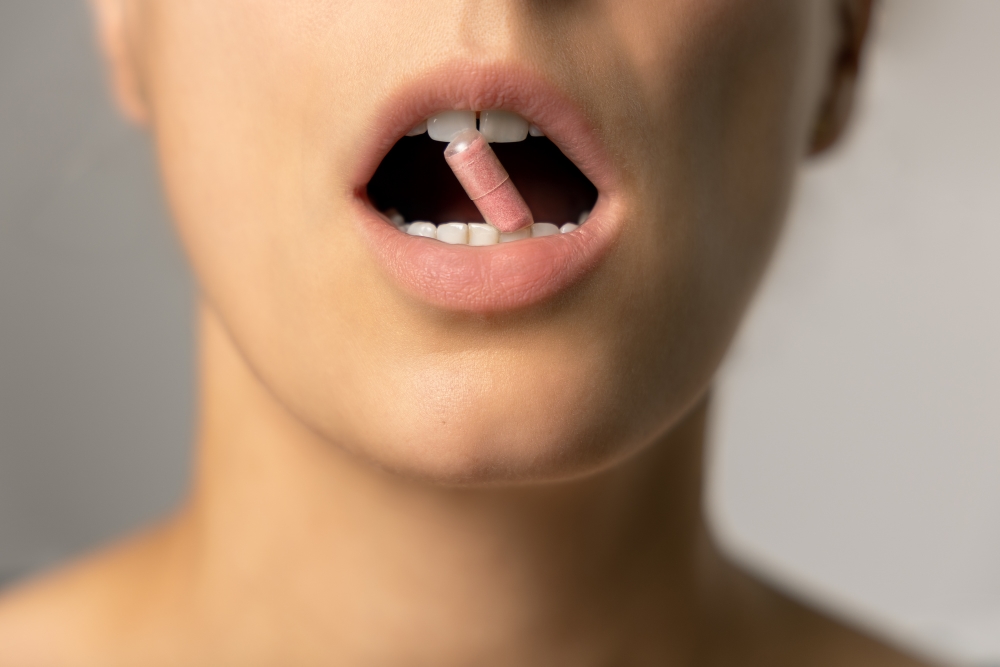The mouth is the gateway for air and nourishment into the body. As the entry point, oral health directly impacts overall well-being. Poor oral hygiene could increase the risk of systemic diseases due to the potential spread of oral bacteria.

This mouth-body link signals the need to make nutrition and oral care a priority. Regularly incorporating supplemental vitamins and minerals could support oral health, which may have positive effects on overall body health.
The role of nutrition supplements in maintaining oral health
Importance of a balanced diet for oral health
A balanced diet forms the foundation for oral wellness. As you consult dental professionals for a comprehensive evaluation, like I do with my family dentist, you’ll understand the importance of limiting sugar, which feeds decay-causing bacteria and erodes enamel. Getting enough vitamins and minerals in your meals strengthens teeth, gums, and their bony foundations. Yet even the most diligent eaters can benefit from strategic supplementation to fill potential nutrient gaps.
Essential nutrition supplements and their benefits for oral health
- Calcium
Calcium helps mineralize tooth enamel and strengthens jawbone density, which anchors teeth. This mineral also aids in proper tooth development in children. Supplementing with calcium alongside vitamin D enhances absorption and utilization for protecting tooth structure.
- Vitamin D
Vitamin D aids the absorption of tooth-fortifying calcium and phosphorus. Some studies also suggest vitamin D fights periodontal disease using its antimicrobial and inflammation-reducing abilities. Strategic supplementation supports enamel remineralization after encounters with mouth acid.
- Vitamin C
Bleeding gums and loosened teeth often indicate vitamin C deficiency. This nutrient nurtures collagen, the foundation of healthy gums, and fast tissue healing. Vitamin C also provides antioxidant action against damaging oral inflammation.
- Omega-3 Fatty Acids
Omega-3s combat gum inflammation, which may lead to gingivitis. They also support saliva production to neutralize mouth acid and may enhance probiotics for oral health.
Studies supporting the effectiveness of nutrition supplements
Research indicates that supplements containing specific micronutrients, such as calcium and vitamin D, may improve outcomes for certain oral conditions. Combining herbal extracts like green tea with micronutrients also boosts positive impacts on dental and gum health.
Adding these to an otherwise established routine of oral care, and a balanced diet ensures a healthy oral environment that impacts several verticals, as we will see below.
Oral health conditions linked to nutritional deficiencies
Dental caries and the role of sugar intake
High sugar consumption feeds acid-producing oral bacteria that demineralize enamel, causing caries or cavities. Deficiencies in calcium, vitamin D, and phosphorous also increase the risk of dental decay. Limiting fermentable carbohydrates while prioritizing minerals strengthens teeth against acidic attacks.
Periodontal disease and its connection to nutrient deficiencies
Gum disease often points to deficiencies in vitamin C, folate, and iron. Vitamin D and calcium insufficiencies are also linked to this oral inflammatory condition. Supporting nutrient levels through food and strategic supplementation aids prevention and treatment.
Oral manifestations of vitamin deficiencies
Oral issues like mouth ulcers, taste disorders, salivary gland dysfunction, and oral cancers relate to deficiencies in B vitamins, zinc, vitamin A, folate, and other nutrients. Some mouth lesions directly indicate certain vitamin deficiencies.
The mouth-body connection and overall health

Billions of bacteria, both helpful and harmful kinds, accumulate in the mouth. Neglecting hygiene can lead to bad bacteria thriving, which infiltrates blood vessels and sets off for major organs. Oral infections are closely tied to cardiovascular disease, diabetes complications, respiratory illness, and more.
Links between oral health and systemic diseases
- Cardiovascular Diseases
Periodontal pathogens that infiltrate blood vessels can lead to arterial plaque and inflammation linked to heart attack and stroke. Nutrient supplementation can help reduce harmful inflammation in both the mouth and body.
- Diabetes
Uncontrolled blood sugar enables oral bacteria to thrive. Two-way interactions between periodontal disease and diabetes worsen both conditions. Good oral hygiene and micronutrient support paired with proper diet and exercise may help manage diabetes.
- Respiratory Diseases
Gum-dwelling germs can be inhaled deep into lung tissue, igniting infection. Oral probiotics that police malicious bacteria aid pneumonia prevention alongside other respiratory issues.
Similarly, even though there is a lack of research findings, there is enough theoretical underpinning to suggest that poor oral health may cause a notable imbalance within the microbiome, which in turn affects mental health. The connection would have seemed outlandish just a few decades ago, but given what we now understand about the role of the microbiome in balancing neurotransmitters like serotonin, and the connection between oral health and gut health, it’s quite likely to consider.
Role of good nutrition and supplementation
A healthy, balanced diet limits inflammatory gum disease and tooth decay that provides pathways for bacteria to spread internally. Strategic vitamin, mineral, and probiotic supplementation further protects systemic health by enhancing oral microbial balance and immunity.
Incorporating nutrition supplements into daily oral health care
Daily oral healthcare routines present opportunities to employ strategic nutritional supplementation for protecting teeth and gums. Consider incorporating supplement intake in the following ways:
- Include vitamin C and calcium-rich foods in your meals to strengthen teeth. Chew xylitol gum after eating to neutralize acid.
- Take omega-3, probiotics, or green tea supplements to reduce gum inflammation and enhance good oral bacteria.
- If intolerant to fish oil, flax and chia seeds offer plant-based omega-3s to combat gum disease.
- Consider using mouth rinses that contain fluoride to neutralize acid and protect enamel while noting that some natural extracts like green tea may offer additional benefits. Swish with vitamin D3 oil to support remineralization.
It’s advisable to consult with healthcare professionals before starting any new supplement regimen. Personalized nutritional supplementation can significantly boost oral health and systemic disease prevention.
Treat your oral health as a priority
Oral health significantly affects overall health due to the mouth-body connection. Poor nutrition and dental hygiene enable harmful pathogens to infiltrate deeper systems. Conversely, a healthy diet and strategic supplementation enhance protective measures against inflammatory gum diseases and dental caries to prevent systemic impacts.
Prioritizing nutrition and oral care routines with targeted micronutrient support offers a proactive, preventative approach to maintaining overall health. For more tailored advice, consider scheduling a nutritional consultation with your dentist or doctor.